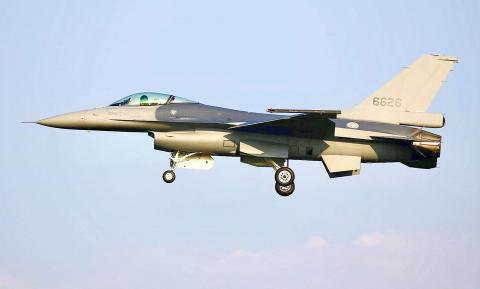The air force yesterday received its first upgraded Lockheed Martin F-16V, the latest variant of the jet, at the Shueishang Airbase in Chiayi County, with three more expected to arrive by the end of the year.
The air force has budgeted NT$129.6 billion (US$4.18 billion) for Aerospace Industrial Development Corp (漢翔航空工業) and US-based Lockheed Martin Corp to upgrade its 143 F-16A/Bs to F-16V standard.
The jet received yesterday had completed hardware and software upgrades in June, and was first spotted by aviation enthusiasts after it began flight tests at the end of August, sources said.

Photo: Yu Tai-lang, Taipei Times
News at the time drew great concern from the Ministry of National Defense and the US, sources said, adding that a full-scale investigation of intelligence and counter-espionage systems were launched to identify the leak.
The air force said it expects that the upgrades would complete outfitting 20 to 24 jets per year until 2022.
Most of the F-16V jets would be repainted and their markings would be refurbished in Shueishang and at the Sincheng Airbase in Hualien County after they arrive to prevent spies from identifying which planes have been upgraded, the air force said.
Since the purchase of 150 F-16A/B jets in 1992, the plane has become the air force’s primary fighter in terms of air-to-air, air-to-sea and air-to-surface defenses.
With the growing disparity of air forces on either side of the Taiwan Strait, the US in 2011 agreed to upgrade Taiwan’s F-16s to one of the most advanced variants of the F-16 family, sources said.
Outfitted with an AN/APG-83 active electronically scanned array and a new modular mission computer, the F-16V has an improved radar detection range and multi-target engagement capability, the ministry said.
The fighters are to have a helmet-mounted cue system linked to AIM-9X Sidewinder heat-seeking missiles, giving pilots the ability to “see and shoot,” it said.
Other advanced weapons the F-16Vs are to carry include the AGM-154C joint standoff weapon — or glide bomb — and AGM-88B high-speed anti-radiation missiles, it added.

NATIONAL SECURITY THREAT: An official said that Guan Guan’s comments had gone beyond the threshold of free speech, as she advocated for the destruction of the ROC China-born media influencer Guan Guan’s (關關) residency permit has been revoked for repeatedly posting pro-China content that threatens national security, the National Immigration Agency said yesterday. Guan Guan has said many controversial things in her videos posted to Douyin (抖音), including “the red flag will soon be painted all over Taiwan” and “Taiwan is an inseparable part of China,” while expressing hope for expedited “reunification.” The agency received multiple reports alleging that Guan Guan had advocated for armed reunification last year. After investigating, the agency last month issued a notice requiring her to appear and account for her actions. Guan Guan appeared as required,

A strong cold air mass is expected to arrive tonight, bringing a change in weather and a drop in temperature, the Central Weather Administration (CWA) said. The coldest time would be early on Thursday morning, with temperatures in some areas dipping as low as 8°C, it said. Daytime highs yesterday were 22°C to 24°C in northern and eastern Taiwan, and about 25°C to 28°C in the central and southern regions, it said. However, nighttime lows would dip to about 15°C to 16°C in central and northern Taiwan as well as the northeast, and 17°C to 19°C elsewhere, it said. Tropical Storm Nokaen, currently

PAPERS, PLEASE: The gang exploited the high value of the passports, selling them at inflated prices to Chinese buyers, who would treat them as ‘invisibility cloaks’ The Yilan District Court has handed four members of a syndicate prison terms ranging from one year and two months to two years and two months for their involvement in a scheme to purchase Taiwanese passports and resell them abroad at a massive markup. A Chinese human smuggling syndicate purchased Taiwanese passports through local criminal networks, exploiting the passports’ visa-free travel privileges to turn a profit of more than 20 times the original price, the court said. Such criminal organizations enable people to impersonate Taiwanese when entering and exiting Taiwan and other countries, undermining social order and the credibility of the nation’s

‘SALAMI-SLICING’: Beijing’s ‘gray zone’ tactics around the Pratas Islands have been slowly intensifying, with the PLA testing Taiwan’s responses and limits, an expert said The Ministry of National Defense yesterday condemned an intrusion by a Chinese drone into the airspace of the Pratas Islands (Dongsha Islands, 東沙群島) as a serious disruption of regional peace. The ministry said it detected the Chinese surveillance and reconnaissance drone entering the southwestern parts of Taiwan’s air defense identification zone early yesterday, and it approached the Pratas Islands at 5:41am. The ministry said it immediately notified the garrison stationed in the area to enhance aerial surveillance and alert levels, and the drone was detected in the islands’ territorial airspace at 5:44am, maintaining an altitude outside the effective range of air-defense weaponry. Following